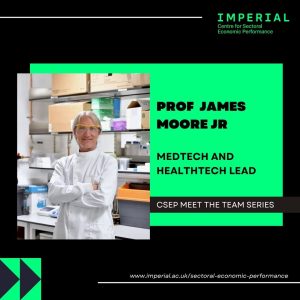Authors:
Professor Eric Yeatman, Professor Chris Tucci & Dr Marika Iivari.
Telecoms is vital national infrastructure that allows us to communicate with people virtually anywhere, whether we are on the go, at home, or at work. In Britain, the industry is well-established and a handful of major players dominate the market. The sector employs 200,000 people, double that of Germany, and provides £38 billion in GVA to the UK economy annually.[1] The industry is also changing with the arrival of 5G and ultimately 6G and the convergence of telecoms with technology such as AI. This presents an opportunity to make the British economy more productive and competitive. But we can only grasp it with the right environment for telecoms companies to succeed.
Using telecoms to drive UK competitiveness and growth
Imperial’s Centre for Sectoral Economic Performance (CSEP), which launched in January 2024, explores ways to improve Britain’s economic competitiveness and drive economic growth.[2] It looks at areas such as competition and technological disruption that demand a joint business, innovation and policy response. Telecoms is an area that we believe has the potential to transform the British economy’s growth outlook. I co-authored a report which examined the industry in detail and provided a list of policy recommendations.[3]
The value of connections a thousand times faster
When we think of telecoms we might picture home broadband boxes and mobile phones or the masts and cables that support this technology. Yet telecoms is about much more than that. It is almost impossible to run a small business without an internet connection, let alone a hospital or a government department. Telecoms is the enabler for practically every other part of an advanced economy. While it represented 20% of the digital sector’s growth between 2010 and 2019, which in turn contributed £150.6 billion to the British economy in 2019.[4]
Telecoms, then, should not be measured by its GVA alone. As 5G is adopted as the next generation technology standard for cellular networks, and more things come online, this will be even more the case. 5G offers speeds 100 times greater than 4G and downloads much faster than WIFI, but also provides other advantages including support for real-time applications such as autonomous vehicles and virtual reality. Its speed, reliability and new capabilities will mean that for a growing number of systems, such as energy grids, transport networks and hospitals, the internet will not just be a means of communication but will be a core part of how they are controlled and managed. 5G adoption will go hand in hand with AI adoption and these technologies will converge to create a new, more powerful, kind of internet.
Productivity gains of £159 billion but an unbalanced investment burden
The rewards are potentially vast. The Department for Science Innovation and Technology predicts productivity gains of £159 billion between now and 2035 on account of 5G.[5] This technology will have other significant uses in Britain, too, whether in reducing carbon emissions or making public services more efficient. This is before we consider 6G, a technology that is expected to come online by the next decade.
None of this is achievable without telecoms companies, but the long-term profitability of the industry is the concern of our report. While companies have invested billions in infrastructure, such as 5G base stations, they can struggle to generate a return on their investment. Meanwhile companies that depend on this infrastructure, such as Amazon, Meta and Google, generate vast profits. Telecoms operators provide the investment burden, but it is non-UK based big tech companies that take the lion’s share of the rewards, with only a handful of major customer-facing content providers based in Britain.
The UK can grasp the rewards with the right regulation
That is not to say British telecoms companies haven’t explored other avenues for growth. In 2022, for instance, BT invested nearly £100 million in the development of business-to-business and business-to-government products that bring together 5G and the internet of things, cloud and edge computing, and AI. The same year, Vodafone and Ericsson partnered in a trial to experiment with virtual reality and network slicing which provided users with an enhanced cloud gaming experience. Yet telecoms companies will not fully grasp opportunities like these without the right regulatory environment. Nor will Britain. It is incumbent, then, on policymakers to change this.
Our report contains thirteen recommendations. Broadly speaking, they refer to deeper collaboration between industry, academia and government to support business innovation; new regulations that include both an international role for Britain in new standard setting and measures to protect the country’s vital telecoms infrastructure and guarantee its strategic autonomy; and the need to consider the broader social and environmental applications of new technologies, particularly where regulation is concerned. The recommendations are spelled out in detail in the report.
The telecoms industry is changing, with the potential to unlock billions for the British economy. Our approach to collaboration and regulation must change too.
Professor Eric Yeatman is a Professor of Electrical Engineering at Imperial College London and co-author of ‘Sectoral Systems of Innovation and the UK’s Competitiveness: The UK Telecommunications Sector’. He is an expert in micro-technologies for sensing, communications and other applications, and has published over 350 papers and patents in these and related areas. He is Chair and co-founder of I-X, Imperial College’s multi-faculty initiative in AI, and was the co-founder and Chairman of Microsaic Systems. He was awarded the Royal Academy of Engineering Silver Medal in 2011, and was made a Fellow of the Academy in 2012.
The Centre for Sectoral Economic Performance at Imperial College London investigates how to improve the competitiveness and productivity of the UK economy and drive economic growth. It is a joint initiative between Imperial’s Faculty of Engineering and the Imperial College Business School – bringing together the UK’s top engineers, scientists and economists with the UK’s science and technology industries to address the major global challenges facing economies such as net zero, economic competition, and technological disruptions.
[1] https://www.gov.uk/government/statistics/dcms-sectors-economic-estimates-monthly-gva-to-december-2022/using-annual-estimates-from-summed-monthly-gva-data-digital
[2] https://www.imperial.ac.uk/sectoral-economic-performance/
[3] https://www.imperial.ac.uk/media/imperial-college/research-and-innovation/the-forum/public/Sectoral-Systems-of-Innovation_Telecommunications_June-2023.pdf
[4] https://www.gov.uk/government/statistics/dcms-economic-estimates-2019-gross-value-added/dcms-economic-estimates-2019-provisional-gross-value-added
[5] https://www.gov.uk/government/publications/uk-wireless-infrastructure-strategy/uk-wireless-infrastructure-strategy#:~:text=By%20transforming%20our%20economy%2C%20widespread,every%20corner%20of%20the%20country.
Read Making Britain a global leader in telecoms regulation in full
 Can you tell us a bit about your background and how you became involved in the CSEP project on the UK MedTech sector?
Can you tell us a bit about your background and how you became involved in the CSEP project on the UK MedTech sector?